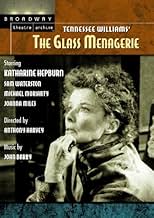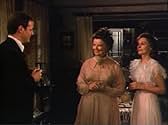Adicionar um enredo no seu idiomaAmanda Wingfield dominates her children with her faded gentility and exaggerated tales of her Southern belle past. Her son plans escape; her daughter withdraws into a dream world. When a "ge... Ler tudoAmanda Wingfield dominates her children with her faded gentility and exaggerated tales of her Southern belle past. Her son plans escape; her daughter withdraws into a dream world. When a "gentleman caller" appears, things move to crisis point.Amanda Wingfield dominates her children with her faded gentility and exaggerated tales of her Southern belle past. Her son plans escape; her daughter withdraws into a dream world. When a "gentleman caller" appears, things move to crisis point.
- Direção
- Roteiristas
- Artistas
- Ganhou 4 Primetime Emmys
- 4 vitórias e 3 indicações no total
- Direção
- Roteiristas
- Elenco e equipe completos
- Produção, bilheteria e muito mais no IMDbPro
Avaliações em destaque
To boot, if you're a fan of Katherine Hepburn, Sam Waterston, Michael Moriarty, or Joanna Miles - and what person in his right mind isn't a fan of all four? - then you need to be familiar with this production, which shows you not only the legendary Hepburn in an interestingly off-type role, but also three more of your favorite actors when they were budding.
Not that this production is perfect. Hepburn, as Amanda, dominates the action entirely too much for my taste, at times reducing the other characters to leaves swirling around the tempest she creates; Waterston sometimes alternates weirdly between a detached Hamlet-like cerebrality and raging tantrums worthy of a young Lear. In other words: the production does not well balance the two characters whose opponency is central to the drama. (It might be argued that Amanda is supposed to dominate the action, and that Tom is supposed to be wimpy, but I disagree. I think Tom's frustrated and repressed manhood needs to be portrayed in such a way as to convey a prodigious, if chained down, load of energy. Remember, this is a self-portrayal of the man who became Tennessee Williams!) True, if you concentrate you can catch some of the subtlety for which Waterston later became justly noted. But he is, so to speak, shouted down by Hepburn, who is entirely too much in focus. It is almost as if this production had been planned as a vehicle for her, and the character of Tom had been treated as a prop.
For my money, the real star of this show is Moriarty's masterful portrayal of the Gentleman Caller. Moriarty does not show us the power-tripping, manipulative bastard often associated with this role, but rather a nice guy who found himself in a compromising situation he never sought, and who tried naively to make the best of his ill-starred encounter with Laura, with the result that he bites off more than he can chew, and hurts Laura all the more by not intending it. The performance here really shines; I was very moved by his awkward feelings of guilt when he realizes his error.
1973's "The Glass Menagerie" directed by Anthony Harvey and written by Stewart Stern, was a televised movie. Based on the play by Tennessee Williams, the movie's runtime is 100 minutes. Rated PG.
"The Glass Menagerie" is a drama set in an apartment in St. Louis, and most of the story takes place during the night. The story takes a dark turn towards the end and seems to phase into a tragedy that adds a sense of sadness. The movie definitely has its changes from the play, but then again, no movie follows the book perfectly. The movie has is still very intriguing to watch because of the life the actors put into their work, specifically Katherine Hepburn. Katherine Hepburn portrays an awesome 1940's mother who hasn't let go of the past. She consistently refers to her younger days when she had many "gentleman callers" and seems to envy her daughters young age, yet she is upset that she is wasting it. Laura's glass menagerie, which is what the movie is titled after, plays a significant role in the plot. Laura's menagerie symbolizes her own fragileness and foreshadows future events in the story. The screenplay by Stewart Stern forms a clear image of the main points of the original story written by Tennessee Williams. The movie may not depict the story line perfectly, but no movie ever compares to the book.
Você sabia?
- CuriosidadesTennessee Williams preferred this film version of his play over the 1950 one.
- Citações
Amanda Wingfield: You are the only young man that I know of who ignores the fact that the future becomes the present, the present becomes the past, and the past turns into everlasting regret if you don't plan for it.
- ConexõesFeatured in The 26th Annual Primetime Emmy Awards (1974)
Principais escolhas
Detalhes
- Data de lançamento
- País de origem
- Central de atendimento oficial
- Idioma
- Também conhecido como
- Tennessee Williams' The Glass Menagerie
- Locações de filme
- Empresa de produção
- Consulte mais créditos da empresa na IMDbPro
Contribua para esta página

























